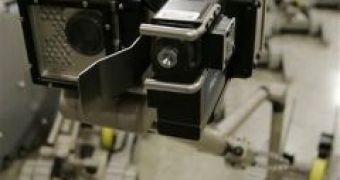3,235 dead. 24,187 wounded in action, of which 10,772 were unable to return to duty within 72 hours. 6,835 non-hostile injuries and 18,704 diseases (both requiring medical air transport).
As of 24 March, 2007, this is the number of casualties in the ranks of the U.S. Armed forces in Iraq since the beginning of the war, and more of them have been caused by bomb attacks than by direct confrontations.
With the war in Iraq entering its fifth year, the federal government is spending more money on military robots and the two major U.S. robot makers have increased production.
Already, there are nearly 5,000 robots in Iraq and Afghanistan, up from about 150 in 2004. Soldiers use them to search caves and buildings for insurgents, detect mines and ferret out roadside and car bombs.
Most of them are used to defuse or to detonate the discovered bombs, and some of them, fitted with video cameras, are used to explore enclosed or hardly accessible spaces, or as miniature spies.
But none of them do what this new gadget was built for: sniffing bombs.
His head is made up of cameras, lights, and Fido - guess what brought it this name - is the first robot with an integrated explosives sensor. Burlington, Mass.-based iRobot Corp. is filling the military's first order of 100 in this southwest Ohio city and will ship the robots over the next few months.
Integrated into the robot is the bomb-sniffing sensor, with its readings displayed on the controller along with camera images. Otherwise, a soldier would have to approach the suspect object with a sensor or try to attach it to a robot. The new robot has a 7-foot manipulator arm so it can use the sensor to scan the inside and undercarriage of vehicles for bombs.
Fido, a 52-pound robot with rubber treads, lights, video cameras that zoom and swivel, obstacle-hurdling flippers and jointed manipulator arms with hand-like grippers designed to disable or destroy bombs, costs $165,000, is produced at a GEM City Manufacturing and Engineering plant, and represents an improvement in bomb-detecting military robots, according to Col. Terry Griffin, project manager of the Army/Marine Corps Robotic Systems Joint Project Office at Redstone Arsenal, Alabama.
U.S. Army officials would not release details of how the sensors work because of security concerns, but they must do a great job, since iRobot posted $189 million in sales last year, up 33 percent, and its military business grew 60 percent to about $76 million.

 14 DAY TRIAL //
14 DAY TRIAL //